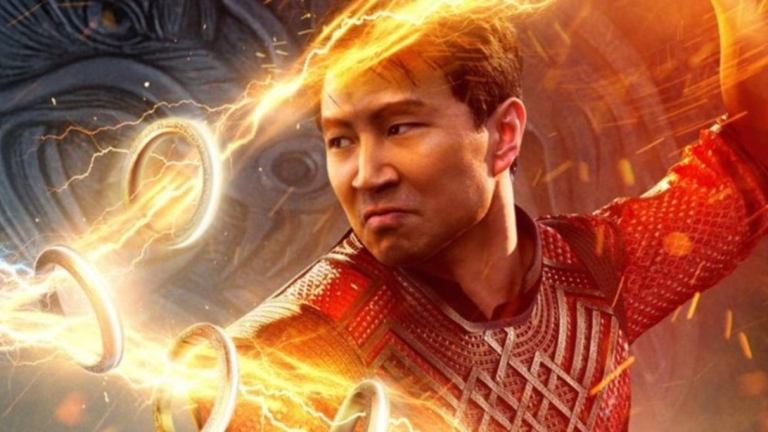Why Shang-Chi Deserves to Lead Avengers 5
Shang-Chi's history makes him the ultimate Avenger for our times.

In the pantheon of the best superheroes of all time, Shang-Chi probably doesn’t rank high on anybody’s list. A superhero best described as “basically Bruce Lee,” Shang-Chi’s street cred is recognized only to readers of his original Marvel Comics series, Master of Kung Fu, when it was published during a widespread kung fu fad that dominated the American zeitgeist.
Despite a modest hit movie in Shang-Chi and the Legend of the Ten Rings with sitcom star Simu Liu, Shang-Chi doesn’t have nearly the same recognition as the MVPs of the Avengers, either. It’s why rumors that Simu Liu’s Shang-Chi may co-lead the onscreen Avengers in the upcoming Avengers: The Kang Dynasty have encouraged mockery online, with fans loudly wanting to return to the pre-Endgame Marvel Cinematic Universe.
But the best superheroes exist as answers to powerful questions. Batman asks what happens when grief is fueled by vengeance, Superman’s saga wonders how an immigrant can represent the best of two worlds, while the X-Men explore what power unity can hold in the face of intolerance.
Shang-Chi has a similarly universal thesis: “Do the sins of my father dictate my life?” Anyone sired by underwhelming fathers can relate to Shang-Chi, as somebody striving to carve out a life of their own, independent of their shameful genetic history. But Shang-Chi’s case is made all the more complicated by its conflict with filial piety, a concept that remains stubbornly prevalent in Asian culture no matter how damaging it may actually be for individuals. Coupled with meta-text of ungainly representations of Asians in American media before it, Shang-Chi is a superhero character who is – or at least, ought to be – seen as artistically enriching as heavyweights like Spider-Man, Iron Man, and Captain America.
Shang-Chi is an A-list superhero trapped in a C-lister’s canon, and it’s why his potential to lead the Avengers on the big screen is no laughing matter. In other words: Shang-Chi is more than qualified to lead the Avengers, and it’s time to put some respect on his name.
Shang-Chi’s origins aren’t as clear cut as you might think. His creators, Jim Starlin and Steve Englehart, were inspired to create a martial arts superhero from the TV series Kung Fu, which famously starred the very white David Carradine as a half-Chinese Shaolin monk. The two pitched a straightforward Kung Fu adaptation to DC Comics, which since 1969 belonged to Warner Bros. and were the producers of Kung Fu. After DC passed, Englehart and Starlin pitched the project to Marvel with all the intellectual property of Kung Fu filed off. Marvel accepted under the condition they include the licensed character Fu Manchu, the famous pulp villain from early 20th century novels by British author Sax Rohmer.
Fu Manchu epitomizes “yellow peril” iconography, a collective of awful tropes and symbols that emerged out of fear and prejudice towards Asian and Chinese immigrants to the U.S. in the late 19th century. He is an amalgamation of all of the fears the Western world harbored towards Asians, their cheap labor, and their mass migration to the U.S.. With his long mustache, yellow skin, and lust for white women, Fu Manchu was a popular villain often thwarted by white heroes. His popularity in fiction unfortunately endured throughout the 20th century, with dozens of film adaptations to effectively center in his own media franchise. In another life, he’d have been a Funko Pop.
In Marvel’s Master of Kung Fu, Shang-Chi is introduced as the son of Fu Manchu. Trained from birth to succeed in his father’s footsteps, Shang-Chi rebels from his set destiny after he learns the true nature of his father’s evil. He embarks on his own path and wanders the world – but mostly New York City – until he can defeat his father for good.
With Shang-Chi’s vengeance against his father serving as the book’s primary narrative, the hundred or so issues of Master of Kung Fu afford plenty of page space to let Shang-Chi be both human and superhuman. From fighting sea monsters to a soulful moment of resentful yearning between Shang-Chi and his ex-girlfriend – a British secret agent named Leiko, who represents an entire side to Shang-Chi that has yet to manifest in the MCU – Shang-Chi is more than just a kung fu superhero from an overlooked period in Marvel’s publishing history. He’s the avatar of themes like self-discovery, inherited guilt, independence, and the limits of filial piety.
Such themes are also found in his MCU incarnation. While the menace of Fu Manchu has been softened into the more authentically complex Wenwu, played by the handsome Tony Leung, Shang-Chi is still a superhero distinct by the blood on his hands and the guilt that haunts him. If Batman is somebody victimized by crime who wishes to never let it happen again, Shang-Chi is someone who is the perpetrator of violence and seeks a path to redeem himself.
For all its outdated aesthetics and narrative scripting that may turn off someone skimming its pages with modern eyes, spending time with the hundred or so issues of Master of Kung Fu actually reveals a brilliant, transgressive character study that often pushes the parameters of the comic book medium. Though it wasn’t intentional on the part of its creators, who aside from artist Gene Day were not of Asian descent, Master of Kung Fu is mainstream comics’ first metaphorical text on the Asian American experience.
Like Shang-Chi, many Asians in America – whether born in the U.S. or having migrated at any age – navigate the complexity of feeling like a stranger, even in places they’re meant to call home. That Shang-Chi is haunted by his father speaks to a lot of Asians in America having to unlearn the toxicity of their upbringing, not to mention striving to defy stereotypes that are forcibly imprinted on them. Anecdotally, I actively hid my competency in math in school just because I was anxious about being yet another Asian whiz kid. (And I certainly never wanted to do anyone else’s homework.)
Because of its publishing in a time when comics were still sold on grocery store spinner racks than comic book stores, Master of Kung Fu didn’t survive the Modern Age of comics; it printed its last issue in 1983, when singular storylines and superstar artists defined the iconic status of characters. While legitimately great Shang-Chi comics have recently emerged from Chinese American creators like Gene Luen Yang and Alyssa Wong, they’ve not yet reached iconic status. It’s understandable that Shang-Chi is far from a recognized figure like his other Marvel brethren, and why MCU fans currently only have one movie for reference amidst a broader downward trend for the once-dominant Marvel franchise.
But Shang-Chi is more than just one movie. Across his 50 years in comics, he’s squared off against unusual but exciting villains while exploring the kind of thematic depths that few other superheroes venture. As the world recovers from both Covid-19 and a surge of anti-Asian violence, having a superhero like Shang-Chi rise to the status of A-lister and lead the Avengers has the potential for retribution against the earliest putrid depictions of Asians in America. More than anyone else in the Marvel universe, Shang-Chi lives up to the name “Avenger.”
